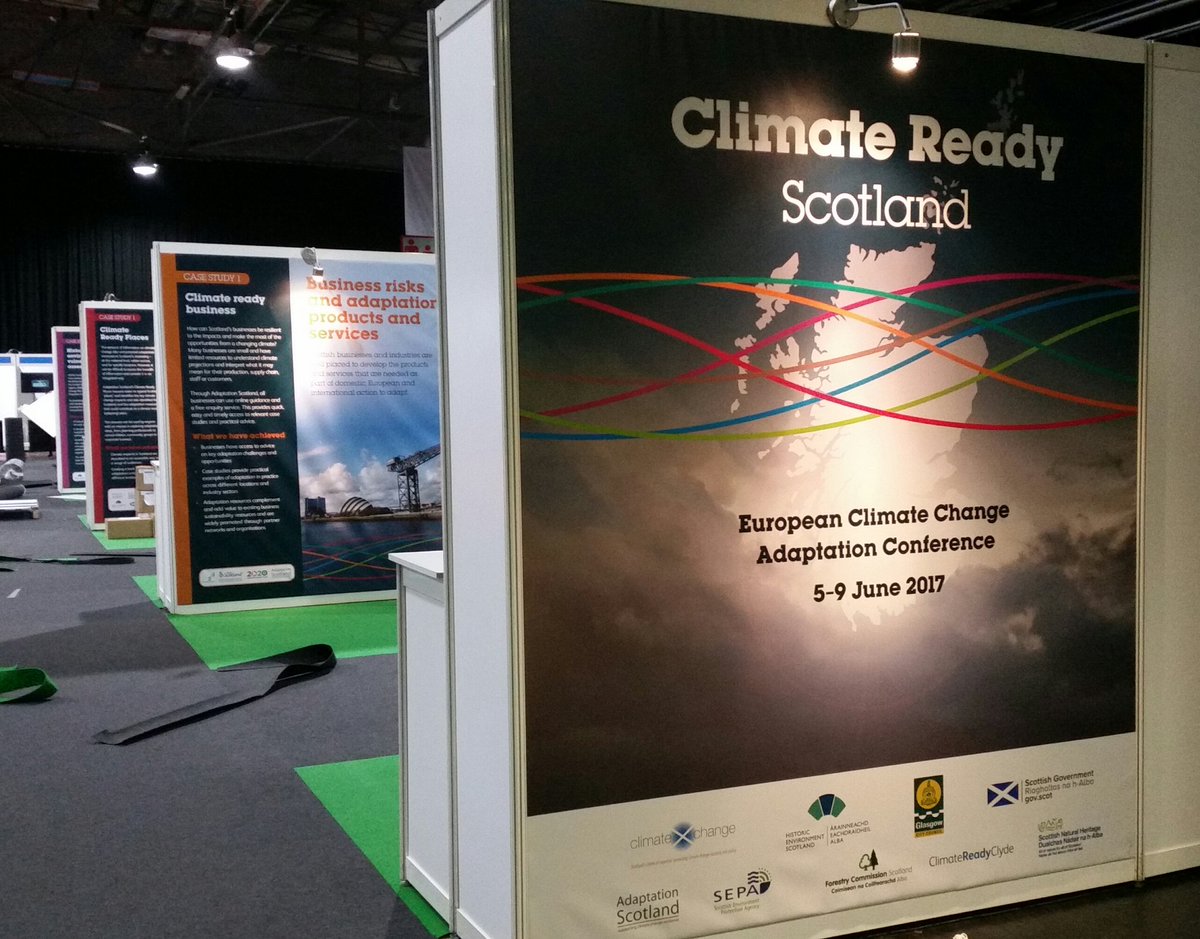 5-9 June 2017. Glasgow. Over 850 people attended the ECCA 2017: Our Climate Ready Future, with
5-9 June 2017. Glasgow. Over 850 people attended the ECCA 2017: Our Climate Ready Future, withpresenters from 48 countries on five continents.
The packed programme featured three plenary sessions, 85 parallel sessions, a poster drinks reception, a Ceilidh and a film screening. This year, for the first time, there was a special Business and Innovation programme which ran in parallel with the first two days of the conference.
 |
| Scotland supports eleven water projects in Africa thanks to Scotland's expertise in water |
The closing Plenary focused on the way forward for climate adaptation research, opened by Diogo de Gusmao-Soerensen, Head of Climate Services, Climate Action and Earth Observations, Direcotrate-General for Research and Innovation, European Commission.
 EUPORIAS: Added value of using a regional climate model for seasonal forecasting in eastern Africa (Florian Gallo, Met Office)
EUPORIAS: Added value of using a regional climate model for seasonal forecasting in eastern Africa (Florian Gallo, Met Office)
Weather and climate information on a seasonal timescale is vital in many developing countries around the world. In particular, information on monsoon characteristics is of primary importance for planning and adaptation for rural population in tropical regions. For this reason, the demand for seasonal data is growing in developing countries. However, the ongoing climate change is having an impact on interannual variability, increasing the difficulty for decision-making on such timescales.
 EUPORIAS project, aims to assess the added value of using a regional climate model (RCM) to generate seasonal climate information over eastern Africa, focusing on the rainy Kiremt season (JJAS).
EUPORIAS project, aims to assess the added value of using a regional climate model (RCM) to generate seasonal climate information over eastern Africa, focusing on the rainy Kiremt season (JJAS).
Inserting rights and justice into urban resilience: a focus on everyday risk (Eric Chu, University of Amsterdam, The Netherlands)
Urban resilience needs to be placed within the context of global systems, which highlights the need to reimagine the role that African cities might play in these global finance, politics and science processes.
Policy Polarities: Migration, Climate Change and Adaptation (Dr. Caroline Zickgraf, The Hugo Observatory, University Of Liège)
Coastal megacities in West Africa, do not possess the infrastructure or socio-economic opportunities necessary to cope with a large influx of migrants. Without appropriate adaptation measures in destination areas, rural migrants arrive in precarious urban slums and often become the most vulnerable to coastal flooding, associated health risks and other human security concerns.
 South Africa: using Desired Adaptation Outcomes to monitor and evaluate the transition towards climate resilience (Mike Harley, Climate Resilience Ltd)
South Africa: using Desired Adaptation Outcomes to monitor and evaluate the transition towards climate resilience (Mike Harley, Climate Resilience Ltd)
South Africa’s National Climate Change Response White Paper (NCCRWP) advocates a risk-based approach to adaptation. This seeks to address the immediate and observed threats of climate change to South Africa’s society, economy and environment, and to identify and prioritise short-to-medium term risk management policies and adaptation interventions to reduce vulnerability and build resilience to climate change.
Agricultural impact and adaptation through irrigation: a focus on Sub-Saharan African countries (Lorenza Campagnolo, Fondazione Eni Enrico Mattei) See article 2015, 28 pages
This paper provides a macroeconomic assessment of climate change impact on Sub-Saharan African agriculture using a General Equilibrium framework considering land heterogeneity, rain-fed and irrigated land, and a dedicated capital endowment for irrigation. This specification offers a more detailed description of climate change impacts under two climate scenarios proposed (RCP8.5 with different assumptions on CO2 fertilization effect). Agriculture results are highly vulnerable to climate change and are largely based on rain-fed and traditional crop growth techniques; therefore, an adaptation plan boosting irrigation practices represents a key strategy to cope with climate change and at the same time to favor development.
Capacity building approaches to climate adaptation in African Rangelands: European institutional inputs and outcomes for livelihoods, wildlife and ecosystems. (Michael Thompson, Frankfurt Zoological Society)
UK and European institutions have been supporting governments and civil society institutions and the private sector to adapt to a changing climate in less developed countries. This paper describes the mechanisms by which European climate change adaptation expertise is being provided to help address these issues. The approaches adopted through international advisory programmes, development assistance, and civil sector peer support includes:
- building networks of expertise (North-South and South-South)
- supporting grass roots civil society movements
- and capacity building focussed on government and civil society institutions.
- Dionisio Perez, CMCC (Euro-Mediterranean Centre on Climate Change) Services for local and economy-wide assessment of adaptation actions in agriculture
- Srini Sundaram, Agvesto Real time risk as a service for farmland assets
- Tom Downing, Global Climate Adaptation Partnership Expert insights and training for adaptation solutions
- Vesela Tanaskovic, Afforest4future Making the deserts green
Moringa Oleifera will end malnourishment and hunger. Afforest4future plans on planting it across the Sahara desert and thus eradicating hunger in the region! - Erik Chavez, WINnERS Weather-index based risk services for agricultural protection


No comments:
Post a Comment